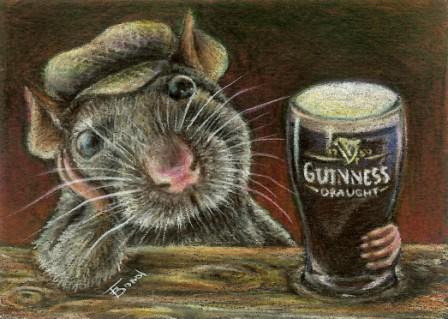.
Days of Wine and Roses

The 1962 epic film starring Jack Lemmon, was a classic about the problems of alcohol dependency. Here is a new report that may offer some interesting science about the effects of alcohol:
Drug Gives Rats Booze-Guzzling Superpowers
Rodents Get Less Drunk, Recover Faster and Appear Less Prone to Alcohol Addiction
By Laura Sanders at Science News
Web edition : Wednesday, January 4th, 2012
Rats dosed with a compound isolated from an ancient herbal remedy appear all but impervious to quantities of alcohol that put their compatriots under the table. Rodents on the drug can drink large quantities of alcohol without passing out, show fewer signs of hangover and even fail to become addicted to alcohol after weeks of drinking, researchers report in the Jan. 4 Journal of Neuroscience.
If the compound proves to have similar effects in humans, it may offer a powerful way to combat alcohol’s dizzying effects, the dreaded hangover and even alcohol dependence. “I think it’s really pretty incredible that one study opens up avenues for so many angles,” says neuroscientist A. Leslie Morrow of the University of North Carolina School of Medicine in Chapel Hill.
Researchers led by Jing Liang of the University of California, Los Angeles began by surveying herbal compounds that reportedly have antialcohol effects. A promising candidate caught the researchers’ eyes: an extract isolated from the seeds of the Asian tree Hovenia dulcis, first described as a primo hangover remedy in the year 659.
In the new study, Liang and her team tested one ingredient of Hovenia called dihydromyricetin, or DHM, on rats, which respond to alcohol in similar ways to humans. After rats were given the human equivalent of 15 to 20 beers in under two hours, the animals passed out in a drunken stupor and lost the reflex to flip over when placed on their backs. The rats took about an hour after this binge to begin to regain control of their bodies and flip themselves over.
But when the rats received a shot of DHM along with their alcohol, they tolerated the booze better. These rats still lost the ability to flip themselves over, but the stupor took longer to take hold and lasted only about 15 minutes.
DHM had benefits beyond the inebriated period, too. A dose of the compound helped ease rat hangover symptoms two days after an alcohol binge by curbing anxiety and susceptibility to seizures.
The standout result, says Steven Paul of Weill Cornell Medical College in New York City, is that DHM also curbed alcohol consumption. Rats allowed to drink alcohol gradually start consuming more of it. But rats that drank DHM-laced alcohol didn’t increase their consumption, the team found.
“When you drink alcohol with DHM, you never become addicted,” Liang says.
Though the results are exciting, they don’t mean that a hit of Hovenia extract can enable a night of consequence-free binge drinking, Morrow says. Alcohol has many effects in the brain, and DHM may not block them all.
Alcohol works in part by changing the behavior of proteins known as GABA receptors, which are involved in curbing brain excitation. DHM blocks alcohol’s effects by latching onto these receptors in the brain. Another compound called RO15-4513, discovered by Paul and collaborators, also blocked alcohol by interfering with GABA receptors, but it caused seizures.
So far, Liang and her team have found no side effects from DHM. The researchers now plan to test DHM’s effect on people.
* * * * *
So, while this DHM compound may potentially offer some promise in medical treatment for people who have problems with alcohol abuse, the more interesting aspect, scientifically, is how the DHM compound may be altering the GABA receptors in the brain. That an exogenously applied compound is show to temporarily alter receptor function (behavior) is very noteworthy for the brain.
For a general, run-of-the-mill indulger in a few drinks now and then, there isn't any meaningful applicability to me.
Here's mud in 'yer eye!
PipeTobacco




4 Comments:
A spirit needs a little booze to put up with this rock.
Good post Pipe, welcome to another new year my friend.. :)
What an interesting study. I never thought it has that effect on rats. I wonder if the same goes for humans. - Pest Controllers
Hi! Please share credit to the image you are using for your article. Image copyright Tanya Bond. Thank you! Tanya
Post a Comment
Subscribe to Post Comments [Atom]
<< Home